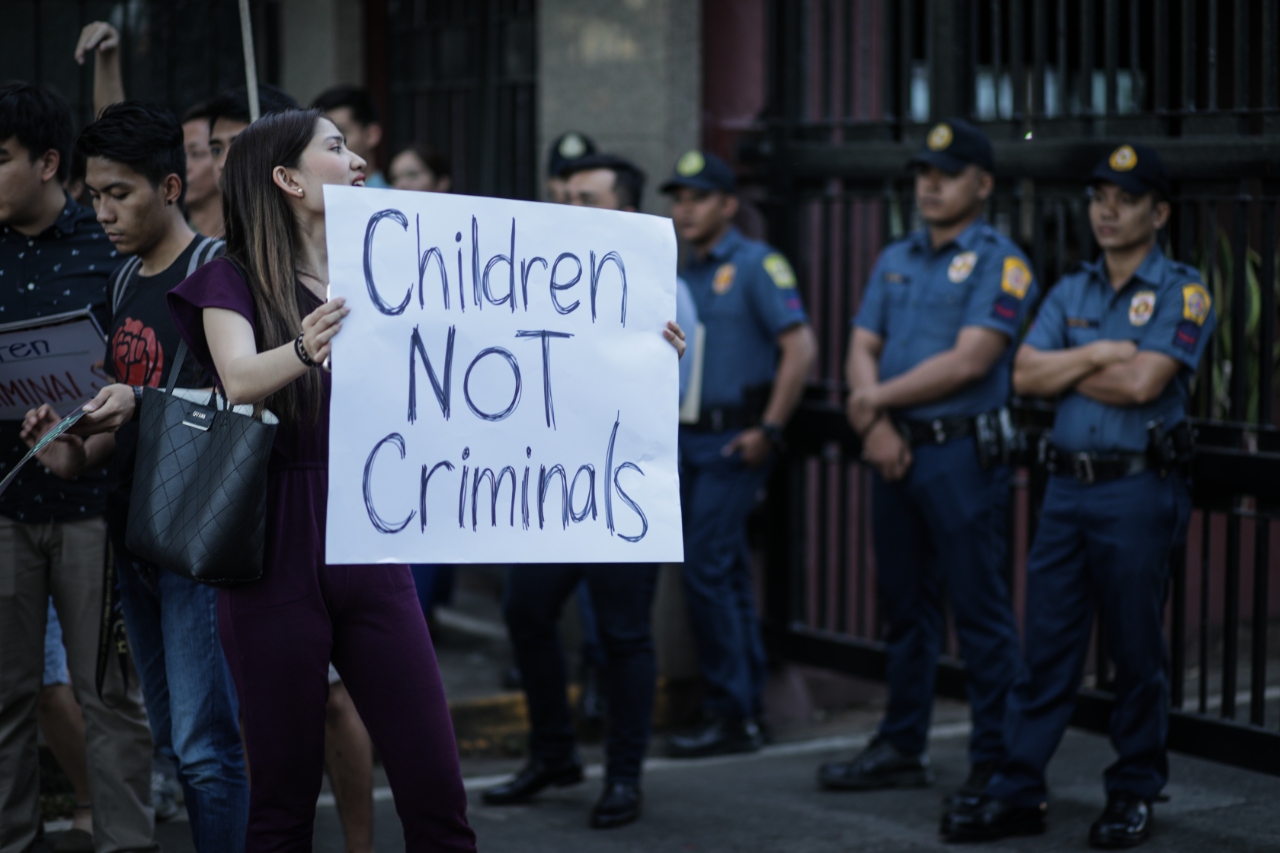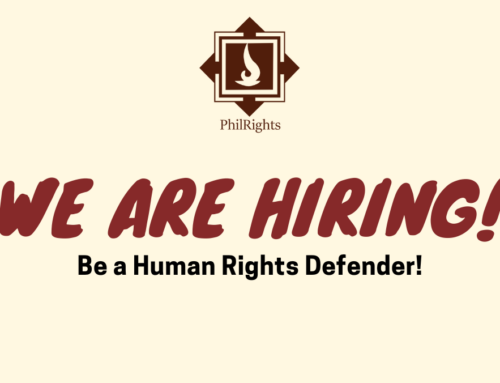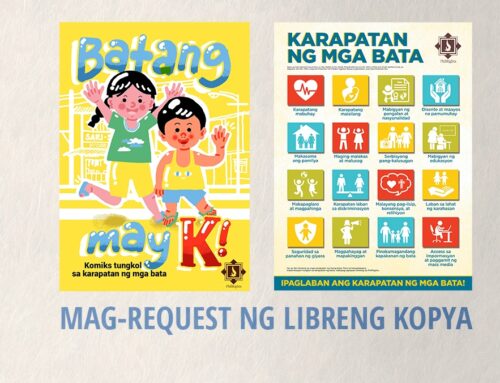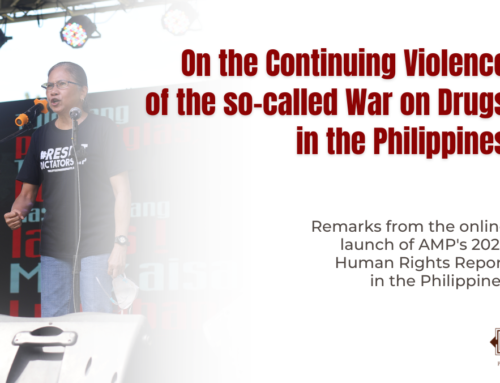by PhilRights Staff
“Batang lansangan may karapatan
Makilahok at mapakinggan
Batang lansangan protektahan
Bigyan ng hustisya at di sa kulungan
Batang lansangan ay di kriminal
…kailangan nami’y pagmamahal”
This is the chorus of a song the street-connected children performed during Bahay Tuluyan’s “A Dialogue with Street-Connected Children”, held on April 12 in commemoration of the International Day for Street Children (IDSC).
The rap song was written by the children themselves based on true accounts of the abuse and violence street-connected children continue to experience. Performed before an audience of duty-bearers, their call resonates: stop criminalizing street-connected children and subjecting them to arrest, torture, cruel and degrading treatment, and detention they still experience just for being in the streets.
Another focal point of the event is the sharing of the outcomes of the 3rd Street Children’s Congress held on February which brought together 47 street-connected children and youth to share their ideas and reflect on their experiences. Together, they came up with a statement that voices out their feelings as children in street situations, grouped together below in 10 thematic areas drawn from the United Nations Convention on the Rights of the Child (UNCRC) General Comment on Children in Street Situations (GC 21).
Katarungan para sa mga Bata. Hindi pantay ang pagtingin sa amin ng gobyerno. Ginugulpi at tinotorture kami ng mga pulis at ikinukulong sa Manila Youth Reception Center, sa bartolina at iba pang madidilim na lugar. Pinagtatangkaan nila kaming patayin. Minsan, sinusubukan nila kaming patayin dahil kami ay sumuway sa batas. Minsan, talagang pinapatay nila kami.
Justice for Children. The government doesn’t see us as equals. We are beaten and tortured by the police and locked up in Manila Youth Reception Center and other dark hidden places. The police threaten to kill us. Sometimes they try to kill us for breaking the law. Sometimes they do kill us.
Pantay na Pakikitungo. Wala kaming bahay at hindi kami makapag-aral dahil wala kaming birth certificate. Hindi pantay ang pagtingin at pakikitungo sa amin. Kami ay inaabuso. Hindi makatarungan ang pagtrato sa amin sa ilalim ng curfew law. Pinipilit kaming paalisin ng mga pulis sa kalye. Kinukulong kami dahil mahirap kami samantalang ang mayayaman ay nagbabayad at pinapalaya agad.
Equal Treatment. We don’t have houses and can’t go to school because we don’t have birth certificates. We are not seen as equals or treated equally. We are abused. The curfew law unfairly discriminates against us. Police force us from the street. Because we are poor we are locked up, but rich people just pay and they are freed.
Pakikilahok at Kalayaan. Kaming mga batang lansangan ay hindi nabibigyan ng pagkakataon na kausapin ang gobyerno. Mababa ang tingin ng gobyerno sa amin, parang mga dumi. Ang mga batang lansangan ay hindi nakakalahok sa mga actibidades ng gobyerno tulad ng mga parada at palaro dahil kailangang magbayad.
Participation and Freedom. We, street children, are not given chances to speak to the government. The government looks down on us, sees us as dirt. Street children don’t get to participate in activities of the government like parades and sports because they have to pay.
Child Labor. Ang mga magulang ay bata pa at walang kakayahang masuportahan ang kanilang pamilya. Kinakailangan naming magtrabaho upang makakain at makatulong sa pamilya. Nauuwi kami sa mabigat at delikadong trabaho dahil hindi kami nakapag-aral. Kami ay namamalimos, nangangalakal, nagtitinda ng sigarilyo, nagiging kargador, nagtitinda ng sampaguita upang mabuhay. Hindi naming ramdam na ligtas kami. Napipilitan kaming ibenta ang aming katawan para mabuhay. Napipilitan kaming magtinda ng shabu.
Child Labor. Parents have families when they are young and can’t support them. Us children need to work to eat and to help our families. We end up in heavy and dangerous work because we don’t have education. We beg, scavenge, sell cigarettes, carry things, sell sampaguita so we can survive. We don’t feel safe. We are forced to sell our bodies to survive. We are forced to sell shabu.
Ugnayan sa Pamilya. Walang pera ang mga pamilya namin pambili ng pagkain at pang-upa. Nagdudulot ito ng mga maraming problema at away. Madalas kami nabugbog sa aming pamilya. Sapilitan kaming pinapasok sa mga shelter na kulang ang mga pasilidad. Dito, nakakaranas kami ng pambubully at hindi kami nakakadalaw sa aming pamilya.
Family Connections. Families have no money and can’t pay for food and rent. This leads to lots of problems and fighting. We are often abused by our families. We are forced into shelters which are not equipped and where we are bullied and can’t visit our families.
Edukasyon. Hindi kami binibigyang pansin ng gobyerno. Maraming mga batang tumitigil sa pag-aaral at walang umaalam kung anong nangyari sa kanila. Wala kaming mga gamit na kailangan namin para sa ekswela tulad ng mga libro at hindi namin kayang magbayad para dito at para sa iba pang requirements. Nakaranas kami ng pambubully sa paaralan.
Education. The government doesn’t pay attention to us. Children drop out and no one checks what happened to them. We don’t have the things we need at school, like books, and can’t afford to pay for these and other requirements. We experience bullying at school.
Mga Pangunahing Pangangailangan sa Buhay. Wala kaming mga tirahan o hindi kami ligtas o walang ang aming mga pangangailangan tulad ng tubig at kuryente. Ang mga lugar ng relokasyon ay masyadong malayo sa paaralan. Kapag kami ay may sakit, maraming kailangang bayaran at kulang ang pera naming para dito. Hindi kami kumikita ng sapat para mabuhay.
Basic Needs in Life. We don’t have houses or they are not safe or don’t have things we need like water or electricity. Relocation sites are too far away. At school and when we are sick, there are many of things we have to pay for. We don’t have money for these. We don’t earn enough money to live.
Proteksyon ng Bata. Naabuso kami ng mga may kapangyarihan. Kapag nagsumbong kami hindi kami siniseryoso. Nakakaranas kami ng diskriminasyon mula so gobyerno. Ang mga bata sa kulungan ay sinasaktan at inaabuso.
Child Protection. The government doesn’t pay attention to us. Children drop out and no one checks what happened to them. We don’t have the things we need at school, like books, and can’t afford to pay for these and other requirements. We experience bullying at school.
Kaligtasan ng Buhay at Pag-unlad. Hindi protektado ang aming dignidad. Kinakailangan naming matulog at magtinda sa kalsada. Napipilitan kaming ibenta ang aming katawan sa prostitusyon at pornograpiya. Damay at nasasaktan kami sa mga riot sa pagitan ng mga kabataan. Takot kaming maging biktima ng extrajudicial killings.
Survival and Development. Our dignity is not protected. We have to sleep and sell things on the street. We are forced to sell our bodies in prostitution and child pornography. We are involved in, and hurt by, riots amongst youth. We are afraid of being victims of extra judicial killings.
Kalusugan at Kapansanan. Hindi sapat ang dami ng mga ospital. Hindi kami makabili ng pagkain at mas nagmamahal pa ang mga ito. Nawalan kami ng mga bahay kaya wala na kaming proteksyon sa panganib. Mababa ang mga sweldo. Namamatayan kami kasi hindi namin kayang makabili ng gamot.
Health and Disabilities. There are not enough hospitals. We can’t afford food and it is getting more expensive. We have lost our houses and so have no protection from danger. Salaries are low. We can’t afford medicine and children are dying as a result.
Kami ay nananawagan sa Gobyerno na tulungan kaming makamit ang mga bagay na kailangan namin:
- Proteksyon mula sa mga Pulis [Protection from Police]
- Proteksyon mula sa mga batas at aksyon na iba (hindi pantay) ang pagtrato sa amin [Protection from laws that treat us differently (unfairly)]
- Ang aming mga opinyon ay napakikinggan [Our opinions are being listened to]
- Proteksyon mula sa sapilitang pagtatrabaho [Protection from being forced to work]
- Tulungan kaming makipag-ugnayan sa aming mga pamilya kung gusto namin [Help us contact our families if we want to]
- Maayos at libreng edukasyon [Good and free education]
- Tiyak na pabahay, damit, pagkain, pangangalagang medikal, at edukasyon para sa aming pag-unlad [Ensured housing, clothing, food, medical care, and education for our development]
- Dapat protektahan ng pamahalaan ang lahat ng bata mula sa lahat ng uri ng karahasan [Protection from all types of violence]
- Proteksyon ng buhay at dignidad [Protection of life and dignity]
- Akses sa pangkalusugang pangangailangan [Access to health care]
Nananawagan din kami sa Gobyerno na:
- Huwag kaming saktan. Alisin ang masasamng pulis. Huwag ibaba ang age of criminal responsibility. Huwag kaming patayin. [Don’t hurt us. Remove the bad police. Don’t lower the age of criminal responsibility. Don’t kill us.]
- Bigyan kami ng libreng pabahay o relokasyon. Magbigay ng libreng edukasyon at ligtas na lugar para aming tirahan kasama ang aming tribo. Alisin ang mga batas na hindi pantay ang trato sa amin. [Give us free houses or relocation sites. Provide us with education and safe spaces to live, with our tribes. Get rid of laws that discriminate against us. Help people see that we are equal.]
- Bigyan kami ng pagkakataon na maibahagi ang aming boses at hinaing. [Give us a chance to share our voices and concerns.]
- Bigyan ang aming mga magulang ng libreng training at tulungan na makahanap ng trabaho. Tulungan kaming makabalik eskwela para magkaroon kami ng maayos na trabaho. [Give our parents free training and help them find work. Help us go back to school so that we can get good jobs.]
- Tulungan ang aming mga magulang na mabigyan ng mga seminar at training tungkol sa epekto ng pang-aabuso. Alamin ang mga nangyayari sa mga shelters, siguraduhin na patas ang pagtrato at walang pang-aabuso. [Help our parents with seminars and training, especially about the effects of abuse. Know what is happening in shelters, make sure treatment is fair and that there is no abuse.]
- Magbigay ng suportang pinansyal para sa pamilyang nangangailangan. [Give financial support to families that need it.]
- Magbigay ng maayos na pagkakakitaan o oportunidad para sa aming magulang, libreng edukasyon at libreng pabahay. [Provide good livelihood opportunities for our parents, free education and free housing.]
- Magbigay ng mga trainings para sa mga pulis tungkol sa pang-aabuso at pagprotekta sa mga bata. [Provide trainings for police about child abuse and how to protect children.]
- Bigyan kami ng pabahay. Bigyang pansin ang mga batang nasa lansangan. [Give us houses. Pay attention to children, especially those living on the street.]
- Magpatayo ng dagdag na ospital. Magbigay ng mga relief goods tulad ng pagkain. Gumawa ng mga libreng pabahay na aming magagamit. Magbigay ng libreng gamot. [Build more hospitals. Provide relief goods, like food. Set up free shelters for us to use.]






